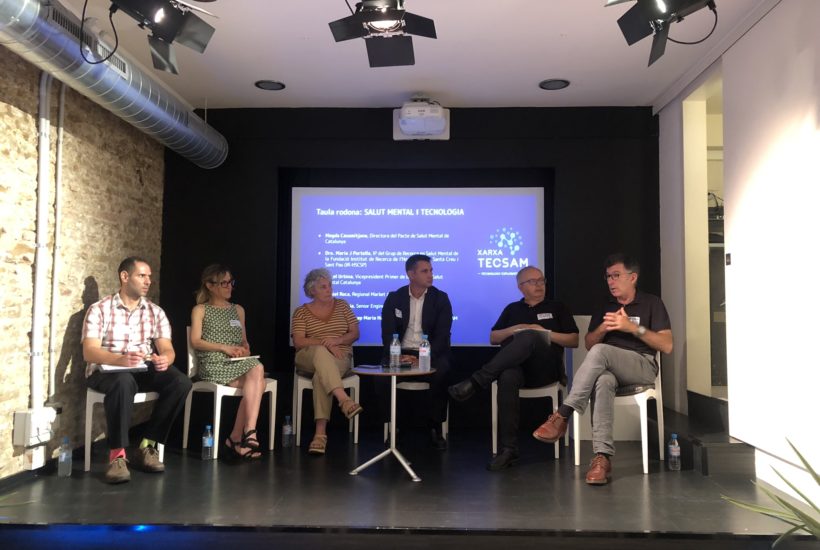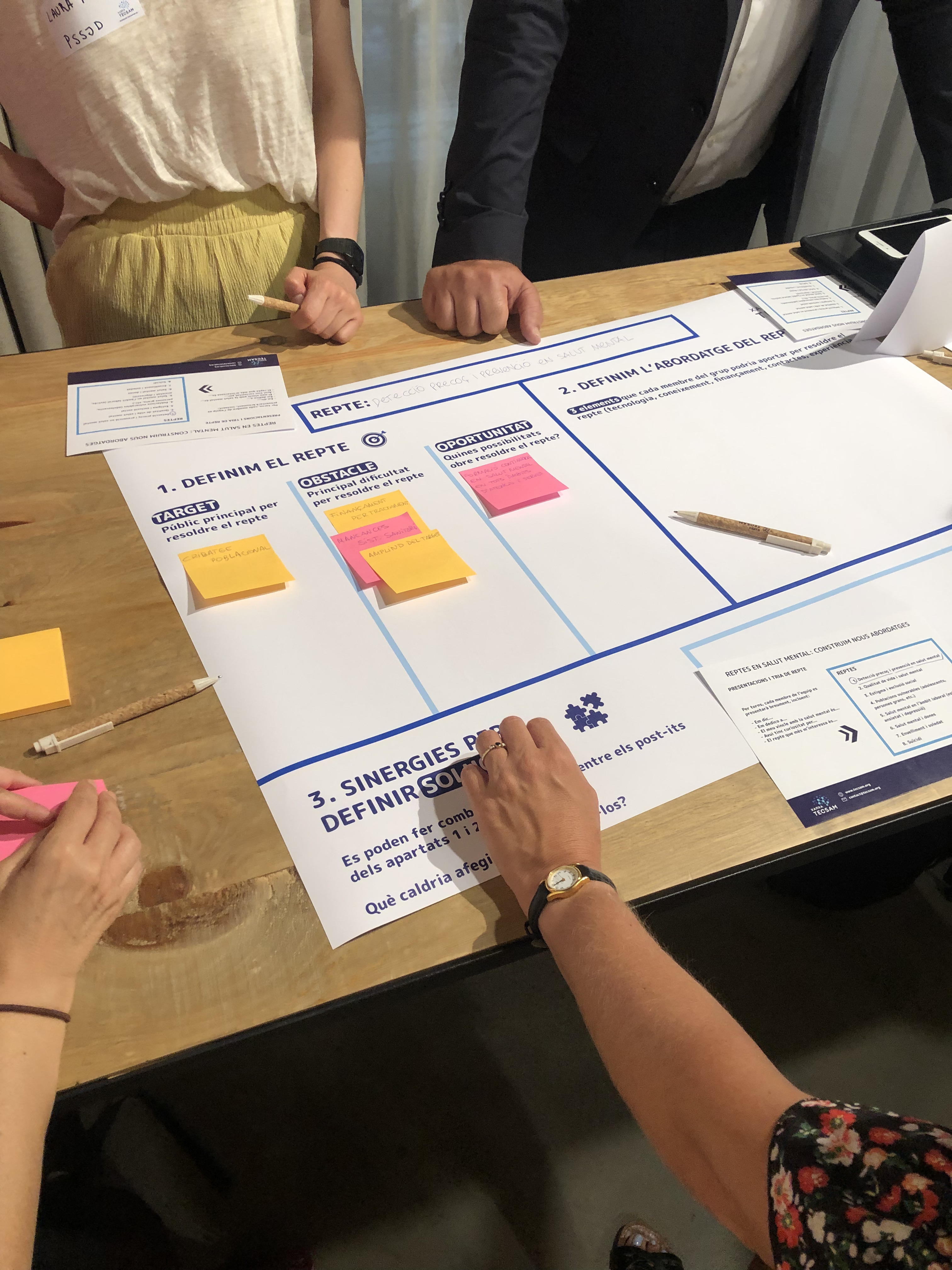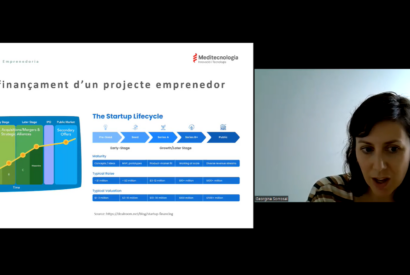6 collective reflections on the use of technology in mental health
More than 50 representatives of the mental health innovation ecosystem met at the Technology Exploration Day to discuss the challenges in mental health.

New technologies can contribute to improving the life journey of people affected by mental health problems: from prevention, to the possibility of replicating treatments, to measuring their recovery and their integration into society
Early detection and prevention in mental health was the mental health challenge that aroused most interest in the networking session, where a collaborative response has been given to the mental health challenges
More than 50 representatives of the innovation ecosystem in mental health met at the TECSAM Network’s Technology Exploration Day (TED). This first face-to-face and open event of the Network, held on Tuesday 21 June at the InGracia space (Barcelona), was created with the aim of being a meeting point to bring together the entire ecosystem of innovation in mental health.
Cross-cutting participation and the desire to generate joint solutions were two constants throughout the meeting. This desire has opened the door to the creation of the foundations of a joint manifesto that brings together the main demands of all the actors representing the innovative ecosystem in mental health and that have been echoed during this day with the aim of responding to the main challenges of mental health in Catalonia. The TECSAM Network, as the organizer of the event and as a nexus of the entire sector of innovation in mental health, takes the helm of this task and will soon disseminate an open document that compiles these key points and demands.
In order to address the relationship between mental health and technology, the Technology Exploration Day held the round table “Mental Health and Technology”, moderated by Josep Maria Haro, coordinator of the Network, with the participation of agents from different fields (research, people affected, public administration, private sector and startups) linked to the innovation ecosystem in mental health. We were joined by: Magda Casamitjana, Director of the Mental Health Pact of Catalonia; Maria J Portella, main researcher of the Mental Health Research Group of the Foundation Research Institute of the Hospital de la Santa Creu i Sant Pau (IR-HSCSP); Ángel Urbina, First Vice-President of the Federació Salut Mental Catalunya; Daniel Roca, Regional Market Access Manager at Otsuka; and Albert Garcia y Tormo, Senior Engineer and IP Manager at Koa Health.

In addition, with the aim of encouraging the co-creation of solutions and new approaches to respond to the main challenges in mental health, a networking dynamic was held among all attendees to encourage group discussion around the technology-mental health binomial from a cross-cutting perspective and with the current and future challenges of mental health under the spotlight.
Starting with the multidisciplinary approach of the experts during the round table and moving on to the co-creation of collective solutions in mental health during the subsequent networking session, the meeting focused on the opportunities that the use of technology opens up in the early detection and prevention of mental problems and the improvement of the quality of life of those affected.
In this sense, during the event, a document was also presented that includes the main mental health challenges identified by people affected by mental health problems in a Co-creation of challenges in mental health day held by the Network in January. The perspective of the group with mental health problems is a central and backbone element of all the actions carried out by the Network, for this reason, the Technology Exploration Day has served to give visibility to these people and an opportunity to share with all attendees the vision in first person and their perceptions of the challenges facing mental health.

These are the 6 main reflections we gathered from both the round table and the networking session:
- New technologies at the service of people
Artificial intelligence (AI), machine learning (ML) and data science have great potential both for those affected by mental health problems and for researchers and healthcare personnel, as they open the door to the transfer of knowledge and the massive use of data for the detection, monitoring, analysis and treatment of mental disorders.
- Affected group, in the centre
The need to place people affected by a mental problem at the centre and make them participants in the process and decisions was one of the main reflections of this open and free conference.
According to Maria Portella, thanks to technology, knowledge is more democratic and within everyone’s reach. However, she stressed the importance of “the development of technological applications including the perspective of the people affected”.
Along the same lines, Angel Urbina believes that applications greatly improve the life chain of affected people: they provide professionals with more tools to identify mental disorders early on, to measure people’s recovery and their integration into society, and to evaluate and replicate the treatments carried out by frontline healthcare professionals. However, he stressed the importance of putting people at the centre of all the advances in AI.
From the institutional perspective, Magda Casamitjana also mentioned that artificial intelligence must be sensitive to people and the particular situation they suffer. Casamitjana considers that these are two elements that can “marry” and feed off each other, but that, in any case, the rights of the people affected are essential in mental health care.
- Non-invasive data-driven technologies
According to Daniel Roca, the pharmaceutical industry is showing an increasing interest in technology. In this sense, he mentioned the importance of healthcare professionals and society in general receiving training in artificial intelligence, and gave as an example some of the innovative solutions that some countries have deployed, such as Finland, which offers free courses on AI to its entire population. “As a society, we must develop and train professionals as a spearhead,” he said, where he believes training plays a key role.
As a representative of the affected community, Urbina has delved into the wide range of solutions offered by AI and the importance of incorporating non-invasive technologies in the extraction, collection and subsequent use of data. As an example, he pointed to the introduction of voice systems to extract key information during psychological consultations.
- Homogenised data system, the big challenge
One of the major challenges identified by the speakers at the round table, and widely discussed in the subsequent networking session, was the need to have a homogenised data system where all the information, knowledge and expertise of mental health professionals can be collected.
According to the institutional representative, at the Catalan level, at present, from the health department and in coordination with the research and universities department, there is a real attempt to create a single platform that brings together and unifies all providers of mental health solutions and brings together all the research and experience in this sector.
“75% of the information is not structured, and on the contrary, machines and machine learning need the validity of the information to work,” said Roca, who also mentioned the importance of having a health system in mental health with a unified language and common indicators.
According to Urbina, technological mechanisms are an opportunity to improve the quality and feeling of life, hence the relevance of having a collaborative data exchange network in the current health system, “with a general database where information is recorded and exchanged, knowledge is made available to everyone and information can be cross-referenced across different areas,” he said.
- Data ethics
For his part, Albert Garcia raised another key aspect of the new technologies applied to mental health: data transparency.
One of the proposals arising from the group discussions was the creation of an ethics committee to evaluate and decide whether the treatment of data is ethical and does not violate the rights of the people affected, always pursuing the welfare and interests of the group in question.
Garcia also believes that it is currently a favourable time to develop technological applications and put them into practice, but that the difficulty lies in defining the strategies to obtain funding and transfer this solution to the market by the start-ups that embark on this path.
- Early detection and prevention of adolescent suicide
During the networking, the debate focused on the challenges posed by the early detection and prevention of health problems. Another topic that emerged with considerable force was suicide, a widespread problem among young people, especially teenagers.
In this sense, one of the discussion panels of this dynamic, delved into all the obstacles that suicide prevention represents for contemporary societies, particularly in Catalonia, due to a series of barriers that aggravate this problem: lack of information, lack of communication between the actors involved (young people affected, family members and professionals), lack of knowledge of the risk factors and the casual chain that leads to suicide, and the stigma surrounding this problem that hinders research and the development of tools to prevent it.
Some of the solutions resulting from this discussion have been the implementation of technology in case identification through data collection, in the form of apps, with the aim of preventing suicide.
The celebration of the Technology Exploration Day has made the objective of bringing together the innovative ecosystem in mental health around the existing relationship between the challenges in mental health and the latest technological innovations a reality. It also aimed to be a meeting and networking point for all attendees to encourage the creation of synergies, contacts and possible collaborations to start proposals or joint projects that fit in the 1st Mental Health Innovation Contest of the TECSAM Network, open until 31 August.
More information about the Technology Exploration Day here.

